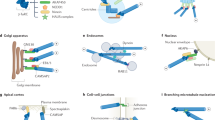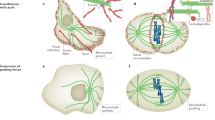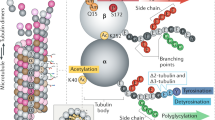Abstract
MICROTUBULES are abundant in eukaryotic cells where they assume various functions1, some of which seem to be at a purely structural level, such as maintenance of cell shape and axonal elongation, whereas others are involved in more dynamic processes, such as mitosis, meiosis, secretion and axonal transport. At least two distinct protein factors of different molecular weight have been suggested2–5 to regulate microtubule assembly. The uniqueness of their role is not unequivocally established because microtubules have also been obtained in the absence of these protein factors, at high magnesium ion concentrations6, in the presence of polycations7 or glycerol11. To correlate better the results obtained in vitro with the mechanism operating in vivo, we have studied the assembly of microtubules in extracts prepared from developing rat brain, differentiating mouse neuroblastoma cells and in chicken sensory ganglia, which may facilitate detection of a factor which induces self-assembly in vivo. We conclude that the high molecular weight protein is seemingly not required for the in vivo assembly of microtubules.
This is a preview of subscription content, access via your institution
Access options
Subscribe to this journal
Receive 51 print issues and online access
$199.00 per year
only $3.90 per issue
Buy this article
- Purchase on Springer Link
- Instant access to full article PDF
Prices may be subject to local taxes which are calculated during checkout
Similar content being viewed by others
References
Olmsted, J. B., and Borisy, G. G., A. Rev. Biochem., 42, 507–540 (1973).
Weisenberg, R. C., Science, 177, 1104–1105 (1972).
Murphy, D. B., and Borisy, G. G., Proc. natn. Acad. Sci. U.S.A., 72, 2696–2700 (1975).
Keates, R. A. B., and Hall, R. H., Nature, 257, 418–421 (1975).
Weingarten, M. D., Lockwood, A. H., Hwo, S.-Y. and Kirshner M. C., Proc. natn. Acad. Sci. U.S.A., 72, 1858–1862 (1975).
Lee, J. C., and Timasheff, S. N., Biochemistry, 14, 5183–5187 (1975).
Erikson, H. P., J. supramolec. Struct., 2, 3393–411 (1974).
Frigon, R. P., and Timasheff, S. N., Biochemistry, 14, 4559–4566 (1975).
Fellous, A., Francon, J., Virion, A., and Nunez, J., FEBS Lett., 57, 5–8 (1975).
Fellous, A., Francon, J., Lennon, A. M., and Nunez, J., FEBS Lett., 64, 400–403 (1976).
Shelanski, M. C., Gaskin, F., and Cantor, C. R., Proc. natn. Acad. Sci. U.S.A., 70, 765–768 (1973).
Scheele, R. B., and Borisy, G. G., Biochem. biophys. Res. Commun., 70, 1–7 (1976).
Schmitt, H., Brain Res. (in the press).
Lockwood, A. H., J. Cell Biol., 67, Abstr., 494 (1975).
Cleveland, D. W., Hwo, S.-Y., Weingarten, M. D., Witman, G. B., and Kirschner, M. W., J. Cell Biol., 67, Abstr., 144 (1975).
Author information
Authors and Affiliations
Rights and permissions
About this article
Cite this article
SCHMITT, H., JOSEPHS, R. & REISLER, E. A search for in vivo factors in regulation of microtubule assembly. Nature 265, 653–655 (1977). https://doi.org/10.1038/265653a0
Received:
Accepted:
Issue Date:
DOI: https://doi.org/10.1038/265653a0
This article is cited by
Comments
By submitting a comment you agree to abide by our Terms and Community Guidelines. If you find something abusive or that does not comply with our terms or guidelines please flag it as inappropriate.



